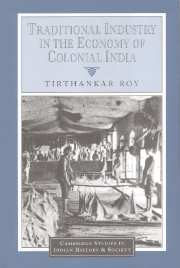6 - Leather
Published online by Cambridge University Press: 05 July 2009
Summary
Most kinds of craft in mid-nineteenth-century India can be classified into two types: commodities, and non-marketed services. Whether a craft functioned as a service or as a commodity depended on the product, and on the producer's caste. Leather and agricultural implements were industries for which a clientele outside the village, or a market inside it, seems to have been rare. On the other hand, in textiles, it was caste that usually distinguished the sellers of a commodity from the providers of a service. The coarse weaving practised by the ‘menial’ castes of central India had the character of a service, one of several that these castes were supposed to perform for the village. They were not ‘weavers’ as caste, and the fact that they rarely specialized as weavers on leaving the village, suggests that there were implicit barriers to their specializing. In contrast, weavers by caste freely sold cloth, whether at the village bazaar or to the merchant engaged in long-distance trade, and, when migrating, tended to settle, and were settled by local rulers, as weavers.
Both sorts of craft were transformed in the colonial period, though historians have been mainly concerned with textiles, an industry already commercialized. On textiles, recent scholarship has argued that the expansion in trade and infrastructure in the second half of the nineteenth century did not quite destroy Indian weaving, but induced institutional and technological changes by integrating markets, making labour mobile, and hastening urbanization.
- Type
- Chapter
- Information
- Traditional Industry in the Economy of Colonial India , pp. 155 - 196Publisher: Cambridge University PressPrint publication year: 1999



